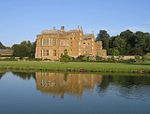North Newington
Civil parishes in OxfordshireOxfordshire geography stubsUse British English from August 2015Villages in Oxfordshire

North Newington is a village and civil parish in northern Oxfordshire, England, about 2 miles (3 km) west of Banbury. The 2011 Census recorded the parish population as 324. The parish is nearly 2 miles (3 km) long east – west and about 1 mile (1.6 km) wide north – south. Sor Brook, a tributary of the River Cherwell, forms part of the eastern boundary of the parish and the B4035 road forms part of the southern boundary. The village is just west of Sor Brook, about 430 feet (130 m) above sea level.
Excerpt from the Wikipedia article North Newington (License: CC BY-SA 3.0, Authors, Images).North Newington
Main Street, Cherwell District North Newington
Geographical coordinates (GPS) Address Nearby Places Show on map
Geographical coordinates (GPS)
| Latitude | Longitude |
|---|---|
| N 52.055 ° | E -1.39 ° |
Address
Main Street
OX15 6AE Cherwell District, North Newington
England, United Kingdom
Open on Google Maps







